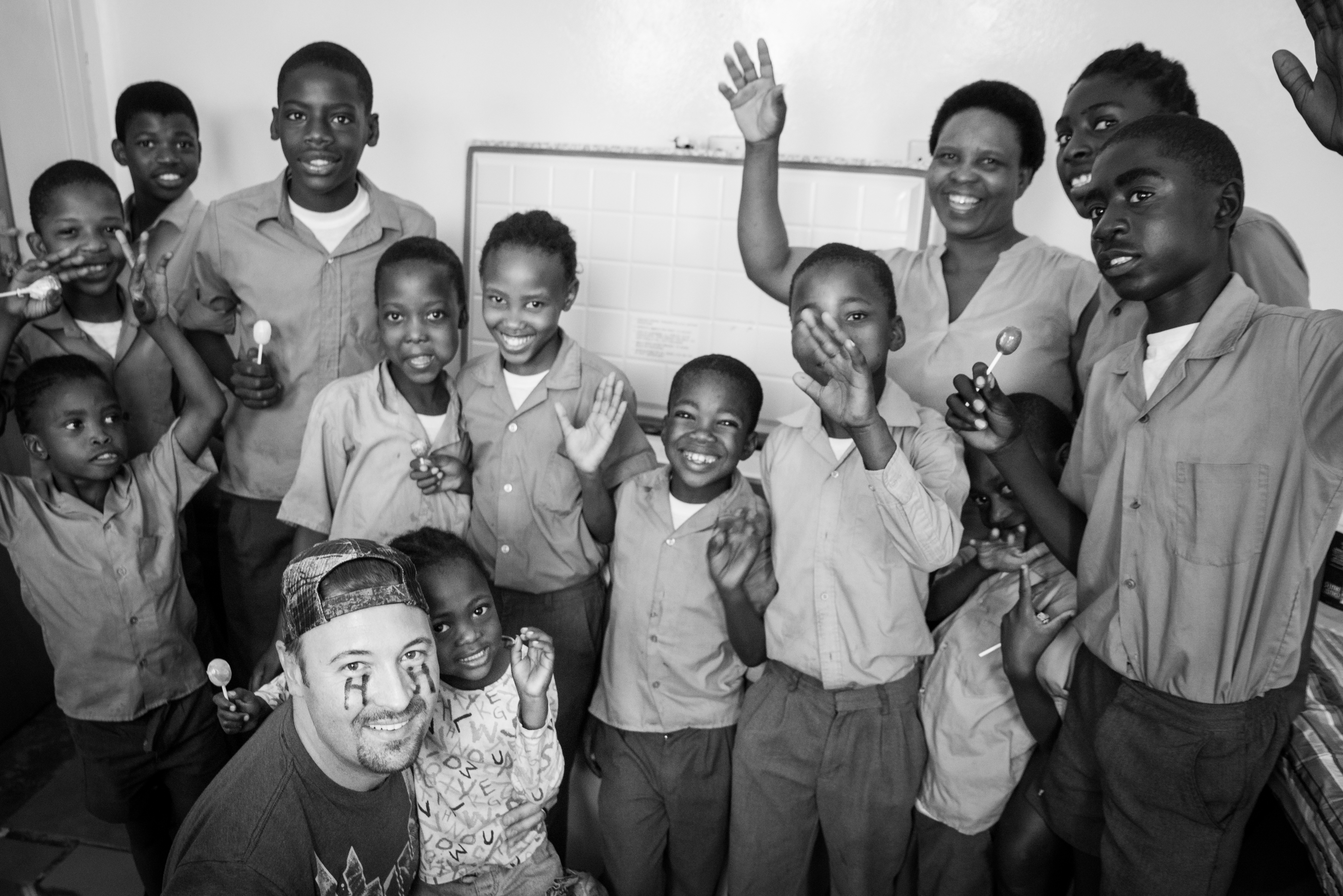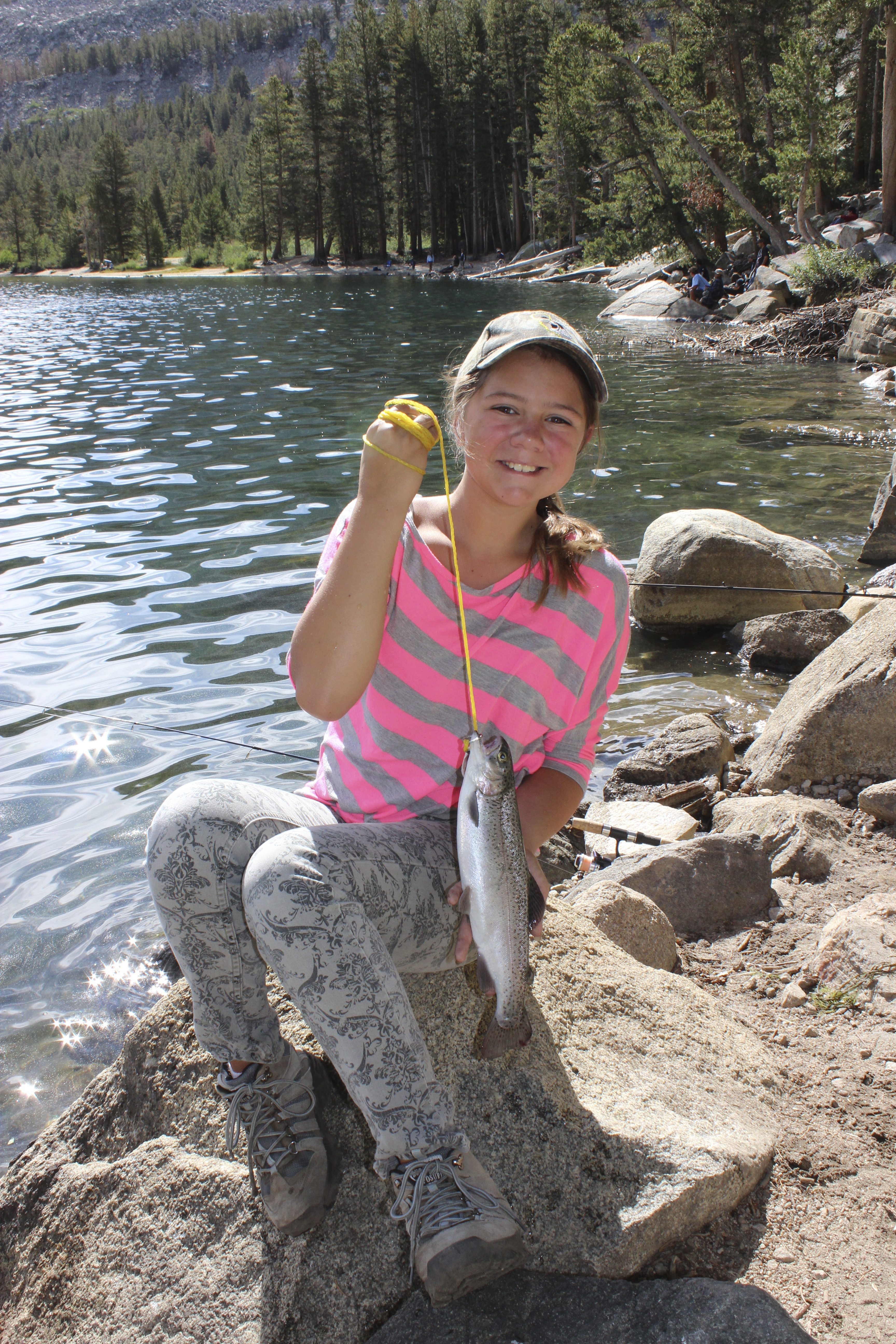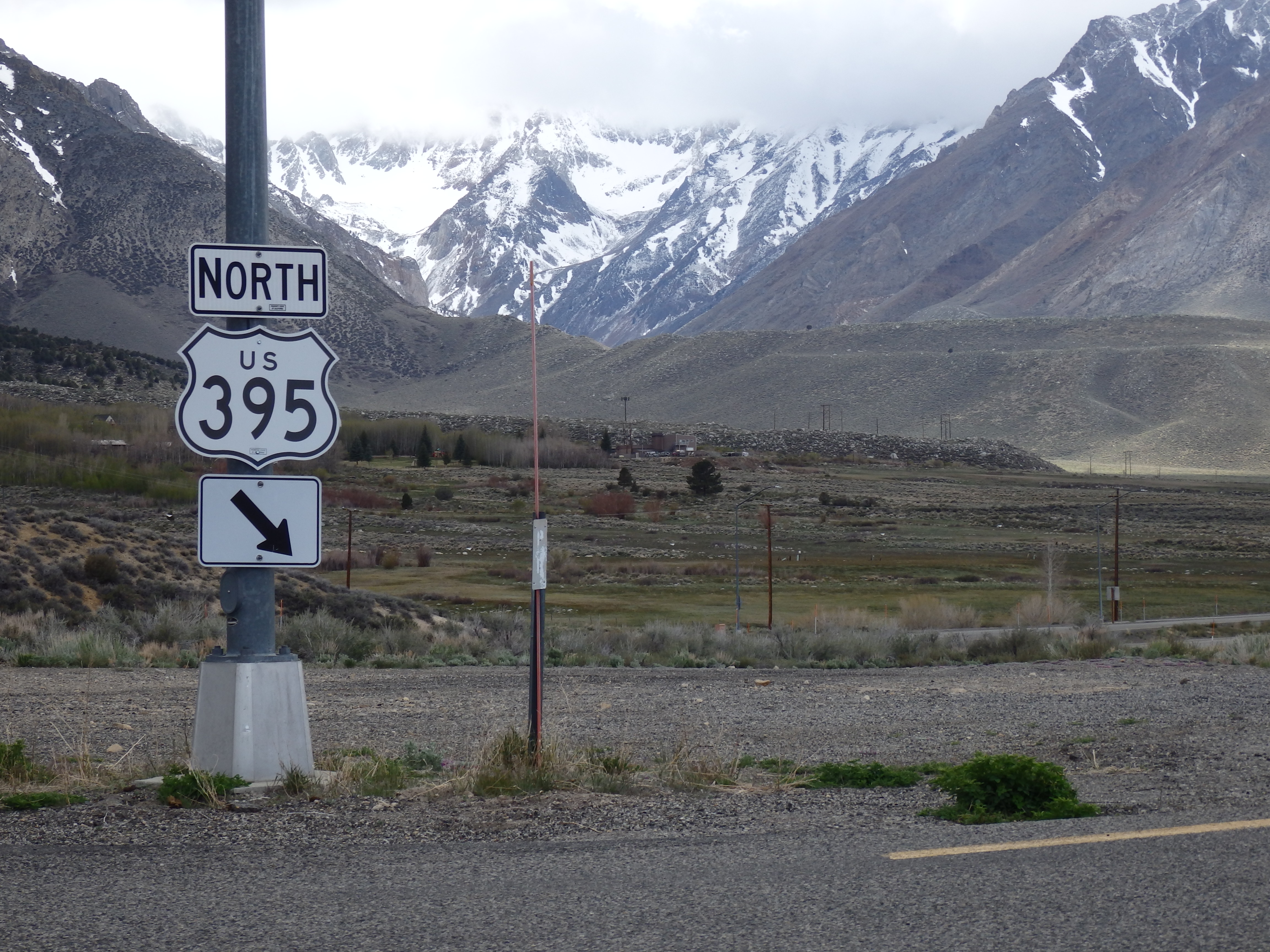Stories Of The Year
Happy New Year! Here at California Sportsman, we’d like to focus on what we hope is a better 2017 than 2016 turned out to be (and apparently a lot of Californians agreed with this year kind of stinking).
Still, we hope the magazine’s content entertained you in 2016. So for the second consecutive year, we bring you our top stories of the last 12 months.
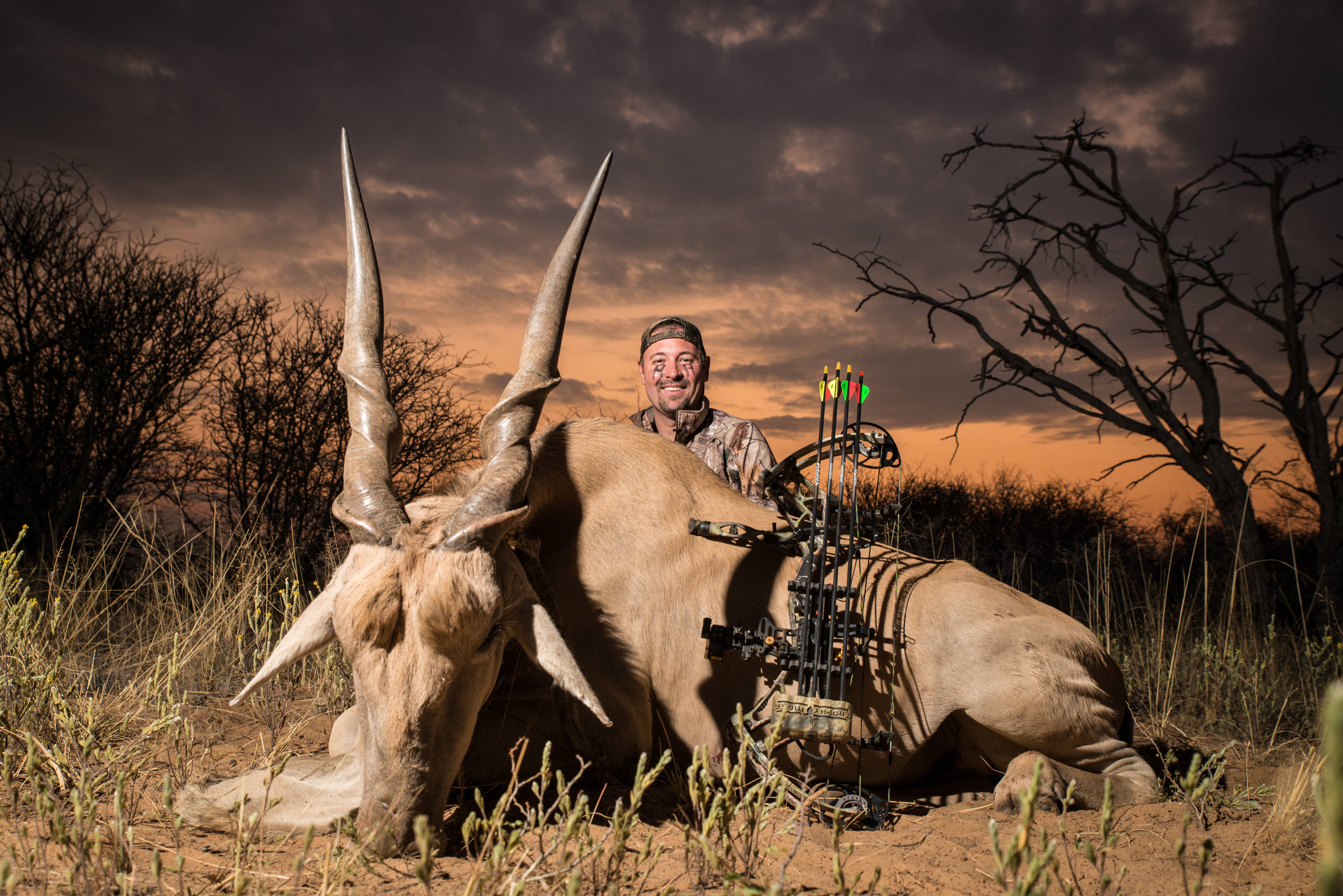
HARTEIS WITNESSED MYRIAD scenes of plight and struggle as he traveled throughout South Africa, but he was also blown away by the resolve of those he interacted with. Greetings with a smile became commonplace.
“They have huts that don’t even have walls – just a straw roof – and they lie there out in the open. And you just see a whole different type of lifestyle. There are other areas where people are starving,” Harteis says.
“They understand work ethic at a different level than what we do. They live every day to survive and they do what they have to. We have the luxury of building a lifestyle and they have the sustainability just to live. I admire them that they get through what they get through because it’s so difficult.”
One of the stops The Hollywood Hunter crew made was to an orphanage in Pomfret, an isolated village in the northwest of South Africa near the border with Botswana on the site of an old asbestos mine. It was a dreary place, home to many former Angolans who fought for South Africa in a series of border wars from the 1960s to 1980s.
But the orphanage has given young residents hope, and Harteis and his party delivered needed supplies and candy for the kids. They also brought meat from some of the harvested animals to feed everyone.
“We spent the day with them; they could speak English to a degree and we would hear them tell their stories – where they go to school and what their goals are as they grow up. It was (great) to interact with them and to see them so excited about the little things,” Harteis says.
“It made me sit there and realize how spoiled I am because they take the simple things and cherish them, as (small) as a lollipop. To me that was one of the highlights, to see the good come out of the hunt and to be able to meet these kids in this village.”
–Hollywood Hunter Freddy Harteis experiences a lot more than spectacular hunting on an African safari. (February)
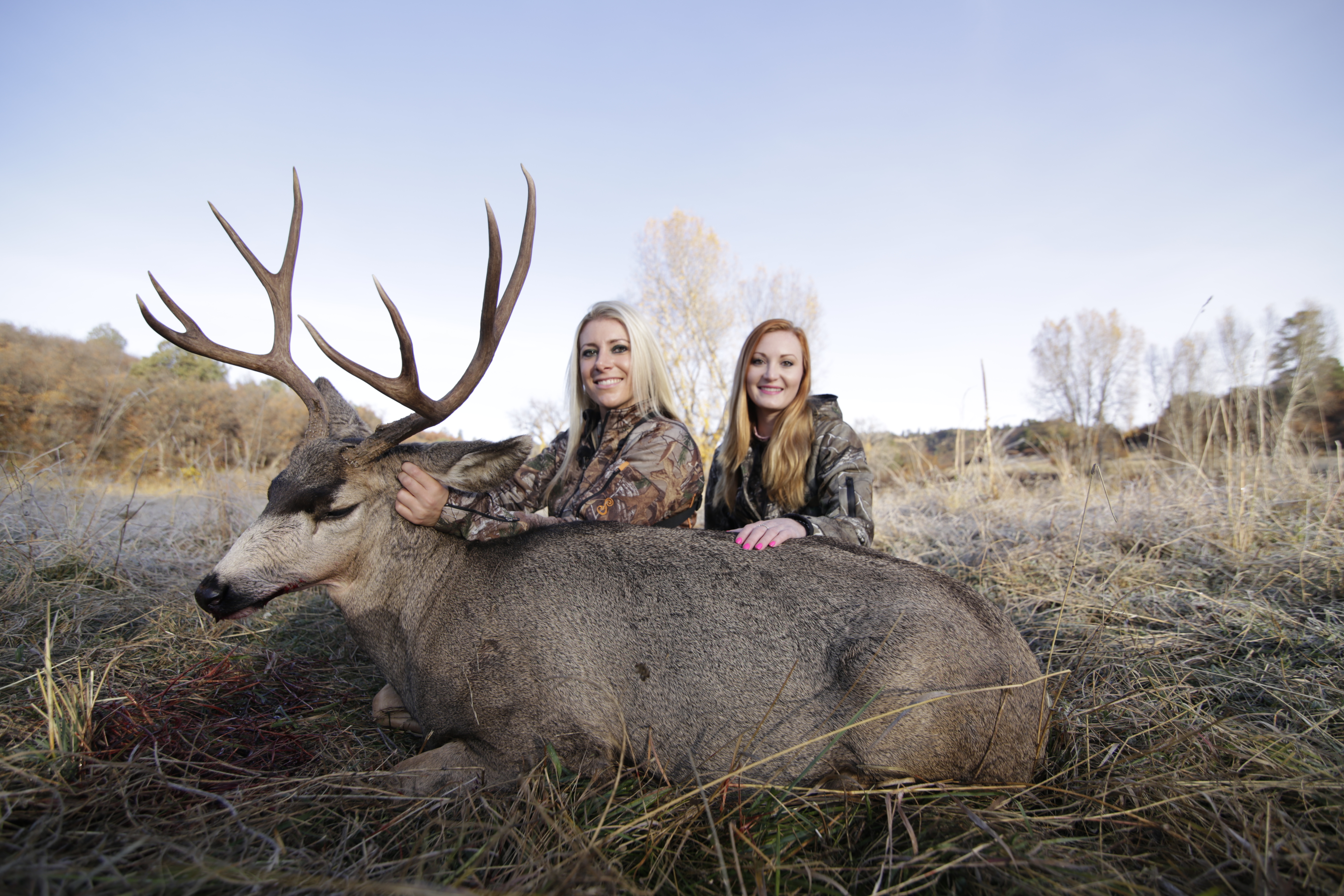
GETTING THAT CLOSE and then not pulling the trigger was a major letdown. I kept thinking that if I had moved just a little quicker or taken two fewer steps, perhaps the bull would’ve been mine.
We continued walking while I beat myself up over the elk that got away, and to my surprise another bull was standing dead-still on the ridge. It had obviously spotted us and was hoping we would not spy it. This time I was just a tad quicker setting up and I had the shoulder in my crosshairs before the animal could move.
I took my shot, heard the bullet hit and watched the elk turn downhill and take off into the timber. We stood silent, then heard crashing as the elk rolled down the hill.
It took a while to hike to the elk, and when we got to it, we found that a tree had stopped the momentum of its fall. It was a magnificent bull. It had beautiful whale tails and some interesting curvy tines.
But it was also in a very steep spot, and it was going to be difficult to get it out. We decided to do our field-dressing there and call for backup.
It was getting dark by this point, but fortunately we got a few good pictures before the light disappeared. Help arrived and we got the elk out.
-Brittany Boddington’s elk hunt in New Mexico. (March)
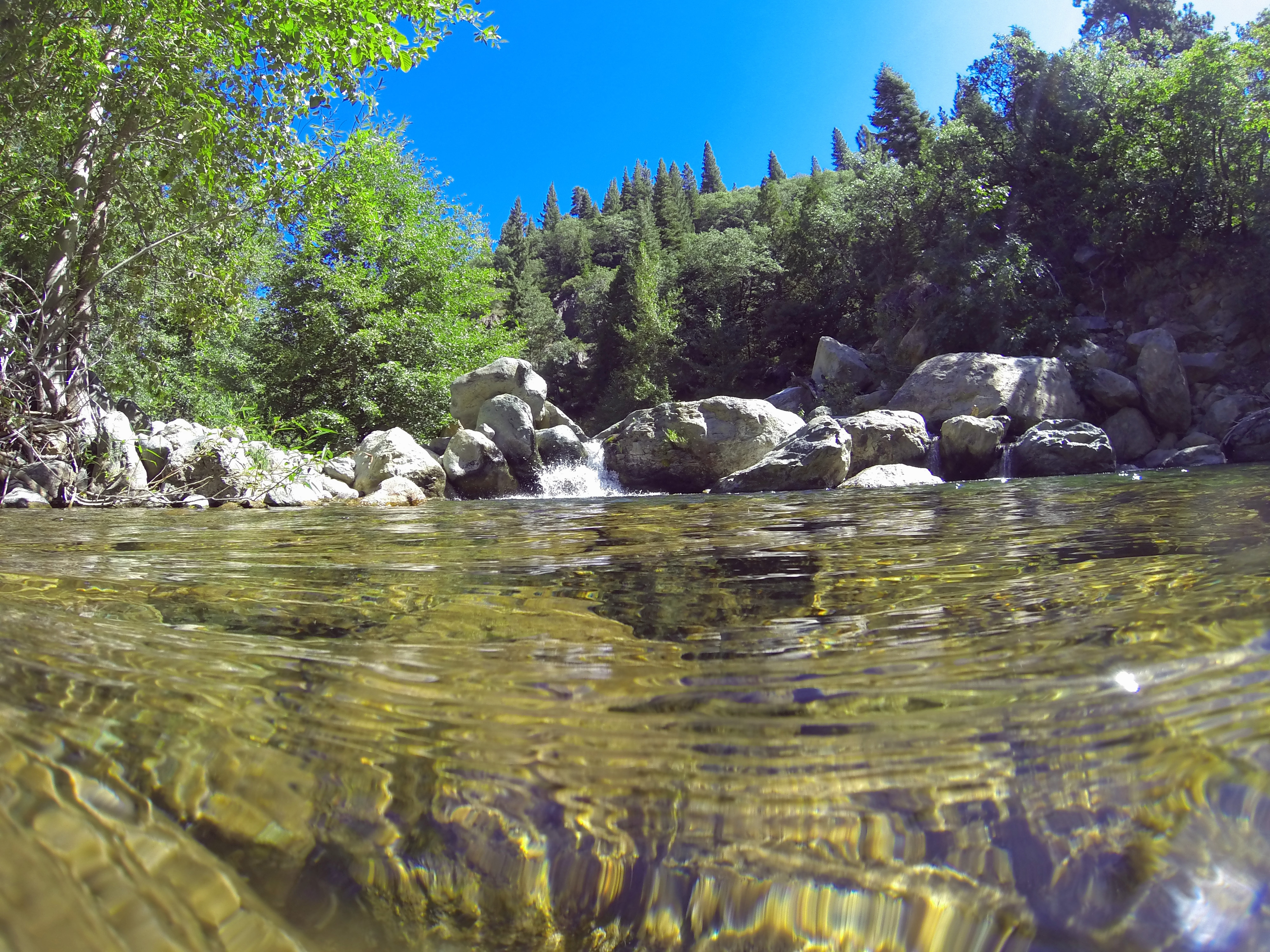
BEFORE THE NORTH FORK Yuba River drops into the town of Sierra City, it enters a gorge of tight granite walls that has been carved out over thousands of years by huge volumes of water. This is where Loves Falls is located, and the Pacific Crest Trail crosses the river over a foot bridge. Fishing access is very limited here, but the short hike down from Highway 49 is well worth the eye candy it provides. It’s absolutely stunning, especially during spring runoff.
As the river drops below Sierra City it heads towards the historic mining town of Downieville. This section of the river has deep plunge pools, longer runs and yet more pocket water. The trout are bigger down in this section, ranging from 9 to 14 inches. The California Department of Fish and Wildlife does plant hatchery rainbows in this section, but there are many wild rainbows to be had throughout the entire watershed.
Anglers also have a chance to hook into larger brown trout that are in the system, as some of these fish can be in the 5-pound range. A few anglers are lucky enough to catch them where the Downie River meets the North Fork. The big browns migrate upstream from Bullards Bar Reservoir in the fall and move up the river to spawn, making a temporary home through spring.
Highway 49 runs along the river from the top of Yuba Pass down to the last bridge, which is just below Carlton Campground, about 11 miles below Downieville. In fact, there are 12 campgrounds to choose from, making this area an ideal getaway vacation for the entire family.
There is so much to do and see: hiking, swimming, gold panning, mountain biking, viewing wildlife, and, of course, the great fishing. There are also numerous creeks to explore in the area, and each one has wild rainbow trout that are so much fun to fish for.
The sheer beauty of Haypress, Lavezzola and Pauley Creeks beg to be explored with their rich foliage and canyon water. And don’t forget about the Downie River; it also has a great fishery beneath its waters.
-Jon Baiocchi on the scenic North Fork of the Yuba River (April)
LIKE MOST, I VALUE my free time. It doesn’t matter what activity I have planned, I always make sure I load up gear for any occasion. A two-piece fishing rod and tackle are always packed in the back of the truck.
During a combo hunting and fishing trip to the Sierras a few years ago, I spent an afternoon with my good friend, Rito Escamilla, on a tributary that dumped into a high-elevation lake. We stumbled on the creek while looking for places to hunt. The stream was rushing and filled with large trout migrating up from the lake.
We stored the hunting gear and broke out the fishing rods. Staying low and stalking within range, we tossed white jigs laced with imitation worms near the staging trout. Bouncing the lures close usually resulted in a strike, and after a short fight in the narrow stream, we’d land the trout, take a few photos and release them.
Down closer to the lake, I spotted a large female in a shallow pool at the side of the creek. Staying in the shadows of a pine tree near the shore, I tossed the white jig upstream of the trout and let the current carry it down. The lure stopped a foot in front of the fish. I jigged it once, the trout glided up and inhaled it.
After a short fight, I landed the trout. Its brilliant colors and patterns were amazing, and after a few snapshots the fish was gently released back into the stream. I sat there and watched the fish slide back into the same exact position in the creek. After that, I put my fishing rod away and just hiked the stream and watched the trout.
-Tim Hovey on memories of trout fishing the Sierras. (April)
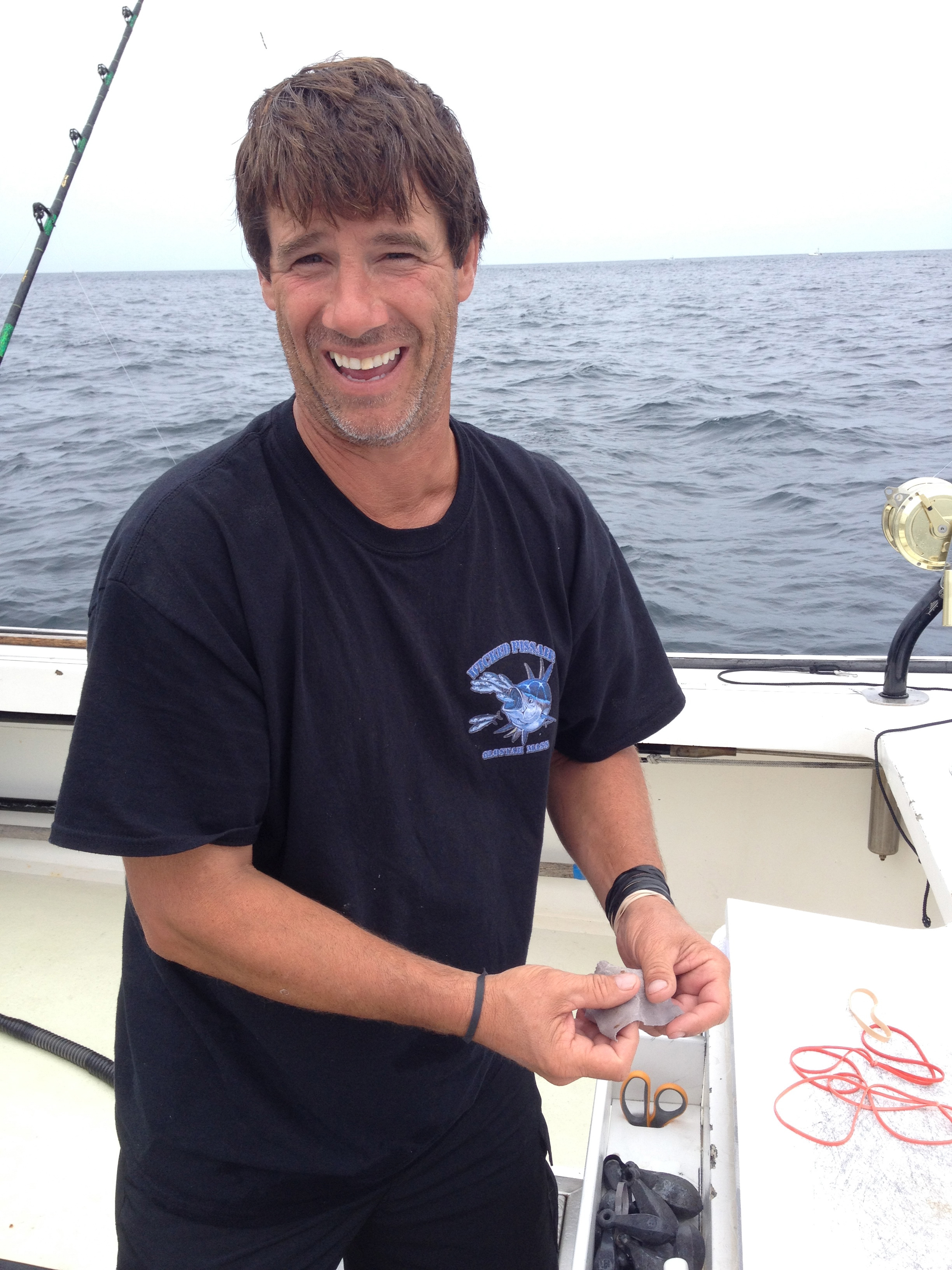
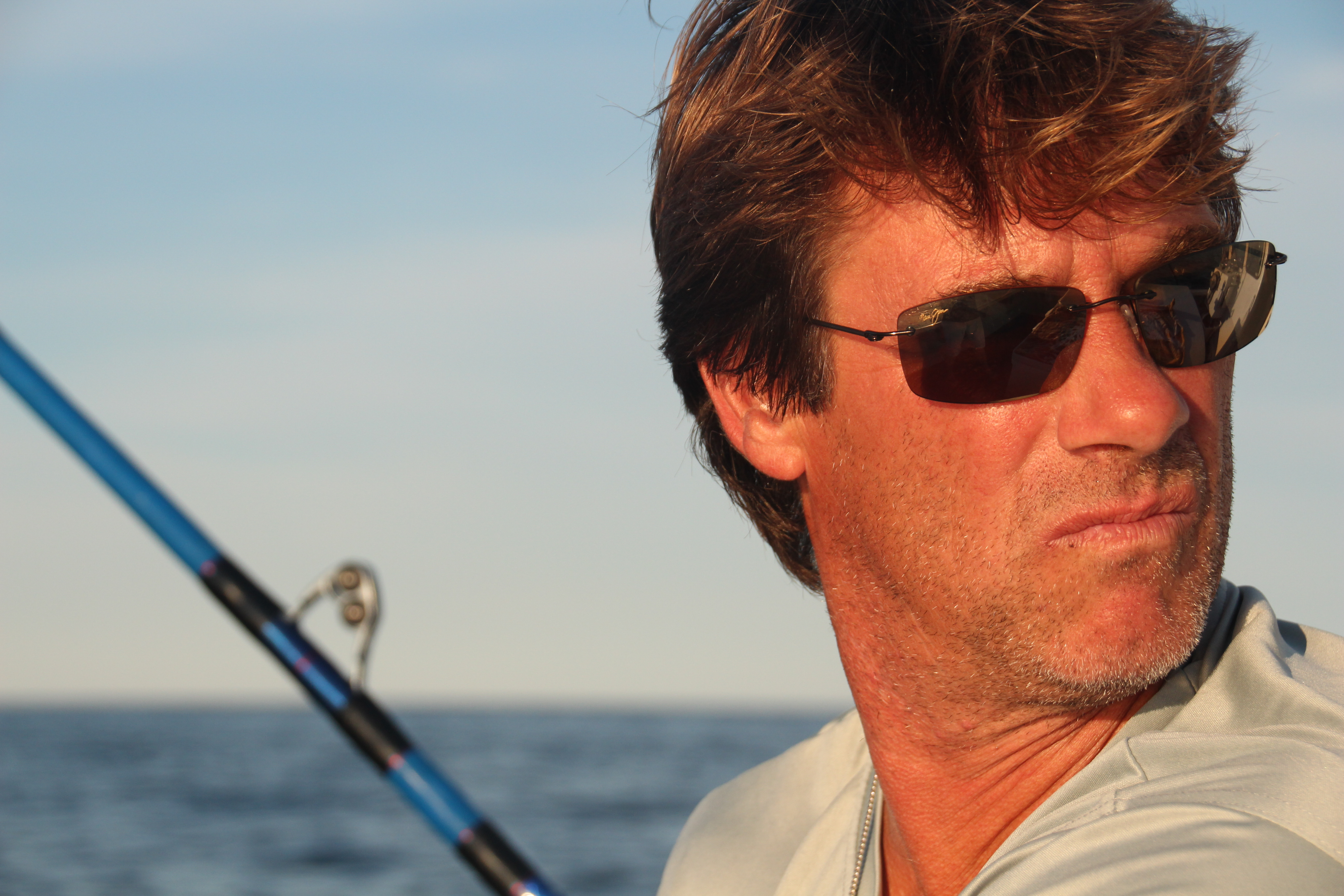
Paul Hebert sounds just like you’d expect a Gloucester, Mass., fisherman would – as if he stepped onto the set of The Perfect Storm with the straight-outta-Fenway ‘Pahk’ New England-style accent.
So is it any surprise one of the tuna anglers from the National Geographic Channel’s show Wicked Tuna would pilot a boat he named the Wicked Pissah?
Commercial fishing for giant bluefin tuna is the only life Hebert’s known as a third-generation Gloucester fisherman. And he, like his fellow fierce competitors, do their jobs the old-fashioned way – not using commercial nets but with rods and reels.
And it’s not simply the kind of fishing where wetting your line means tuna will be pushing each other out of the way to bite your bait.
“I know people who have been going for five years and never ever caught one,” Hebert says. “I know ones who have lost their house and their families – everything they own.”
“Doing it for a living, that’s why all the guys have to live out there. We never used to live out on the water. We went out every day but we never went out there for a week at a time. You have to now because everything is so expensive.”
“If you don’t catch a lot of tuna, you’re not going to get by in the winter; that’s why we’re so competitive with each other. We fight, we lie to each other because we know what’s coming: a long-ass winter,” Hebert adds with a laugh.
-Commercial tuna fisherman Paul Hebert of the National Geographic Channel’s Wicked Tuna. (May)
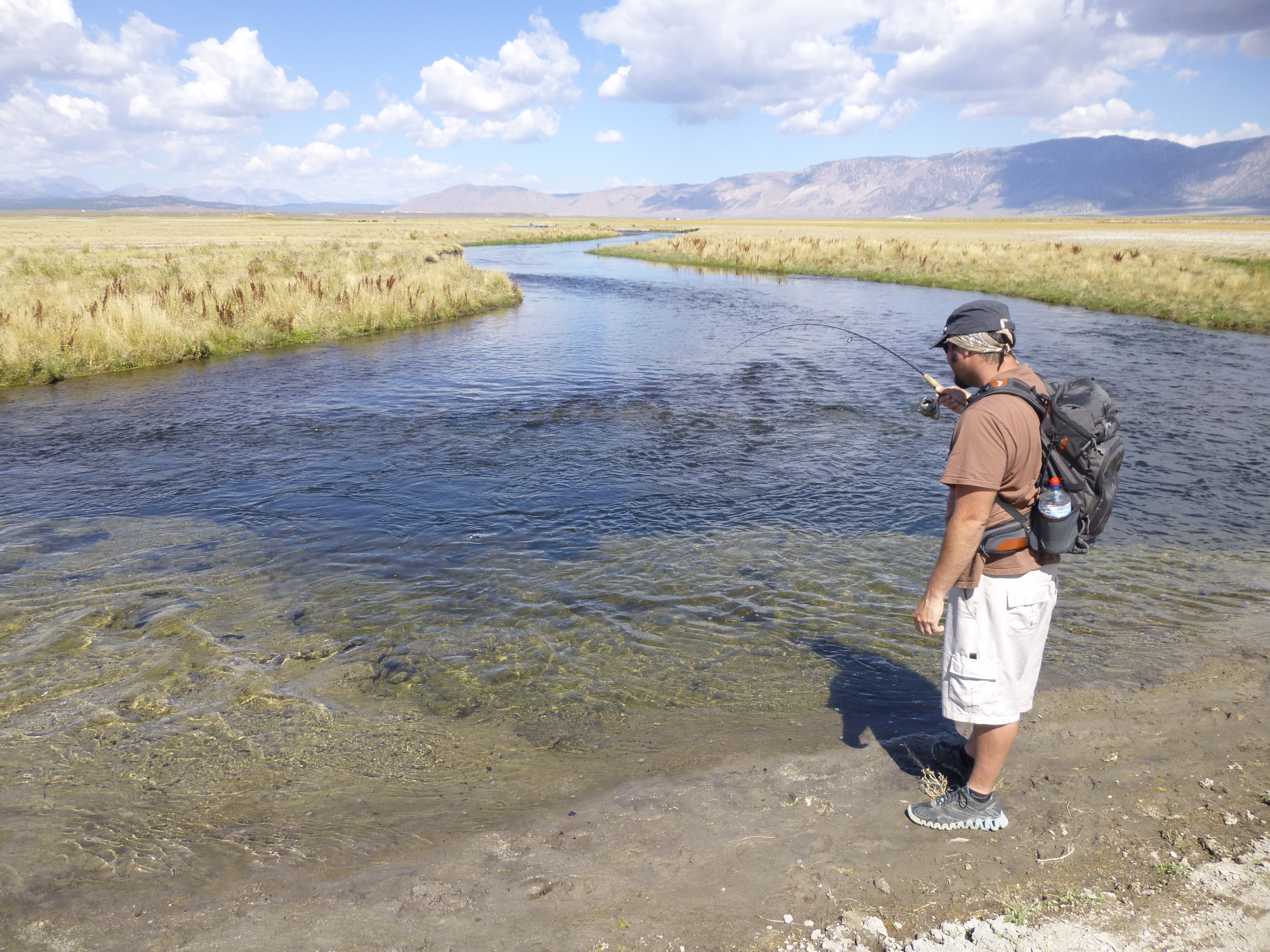
There is an arguably-overused saying along the lines of, “the journey is part of the destination,” and that holds a lot of water when it comes to fishing. For Southern Californians especially, it holds true for making the pilgrimage up U.S. 395 to reach the Eastern Sierra.
For Sierra anglers heading up from SoCal, Highway 395 is not a long, boring highway that needs to be endured before receiving the gold at the end of the rainbow, but rather a portal to a meaningful place that gradually takes on appearance of the destination, and less like the rat race in the rearview mirror.
While blasting northward on the holy highway toward conifers, peaks and trout, 395 itself has a lot to offer. Most travelers have been making the trek for years, if not decades, and have their own favorite places to stop, eat, explore, stretch their legs, maybe even fish before getting back on the road. Mine and yours may have a lot in common, or none at all. The point is, enjoying Highway 395 in your own way adds some cool elements to your trip and makes the drive seem shorter, even though, technically, it takes more time.
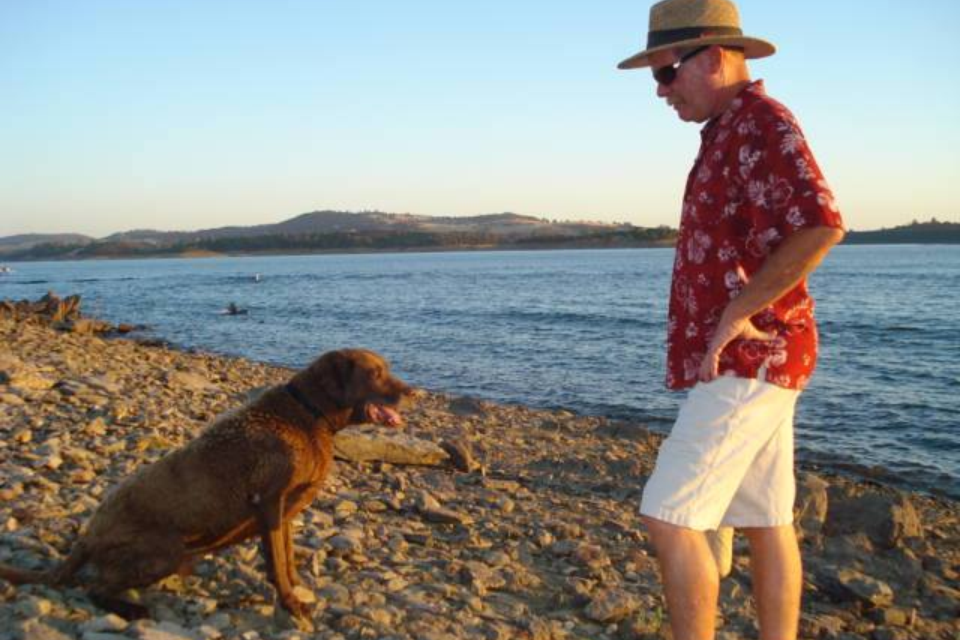
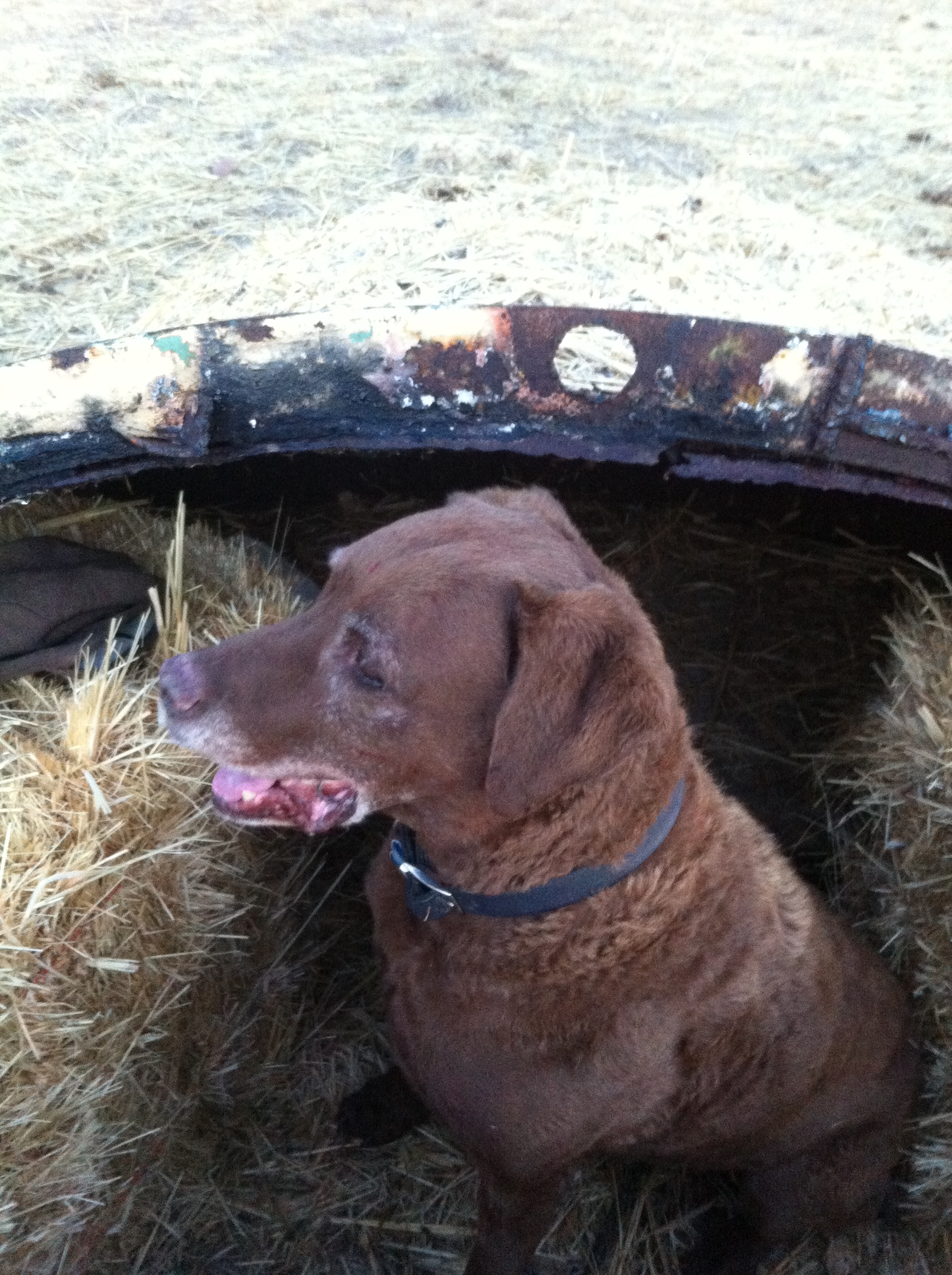
RUSTY WASN’T MUCH of a watchdog. He’d make a tremendous racket when strangers arrived – his size and noise were indeed menacing – but one kind word from the intruder and everybody was friends forever. It became especially kindred spirits if the strangers had a ball to throw.
My primary interest, of course, was whether Rusty could or would hunt, so I contacted a well-known dog trainer I was familiar with. He suggested I teach Rusty basic commands, such as “whoa” so I could control him in the field. In a matter of two weeks I had Rusty under reasonable control. He was smart and eager to learn and please. We took him to a local pheasant club to let him sniff around. He immediately went into unmistakable “bird’’ mode and jumped a rooster pheasant. He later proved to be a fantastic retrieving dog as well, both on waterfowl and pheasant.
We had a slight scare when I decided to take Rusty on a dove hunt. He bolted when I touched off a shot and I thought he was gone forever. But he ran directly to the truck and jumped into the bed. I figured he was gun shy. The dog trainer suggested we start shooting blanks 30 or 40 yards away from Rusty during feeding time, and then move closer every couple of days. Rusty responded to that tactic quickly and never again flinched around firearms. In fact, he began showing a love of guns and boots and vests and pickup trucks. The slightest hint of loading hunting gear in the truck got his juices flowing.
Rusty’s considerable size and strength provided him with great durability. He hunted hard and often with minimal consequences. Only once did he visit a veterinarian due to injury: when he was 3 there was a soft tissue problem in his foot. The vet took X-rays and wanted to amputate. A second opinion prevailed and he was fine in three days.
Rusty soon became the buddy of all my neighbors and relatives, sometimes to the point of irritating them and me. While everybody loved him and gave him treats to eat, he turned over garbage cans all too often and once was caught on a trail camera in a neighbor’s garden with a huge tomato in his mouth. He probably thought it was a ball. Another time, he swallowed my cousin’s new leather glove that was tantalizingly left on the seat of his motorcycle.
We took Rusty on myriad bird hunts: To Vale, Ore. – a 600-mile drive, for pheasant, waterfowl and quail. To Butte City in the Butte Sink for ducks and geese. To the local hunting club for pheasant, just 15 minutes from home. And to private ground in Calaveras County for pond jumping.
Near or far, Rusty was excited to go. He never got enough of riding in the back of the truck or hunting and retrieving birds.
-Brad Hall, on the life and death of his beloved hunting dog. (February)
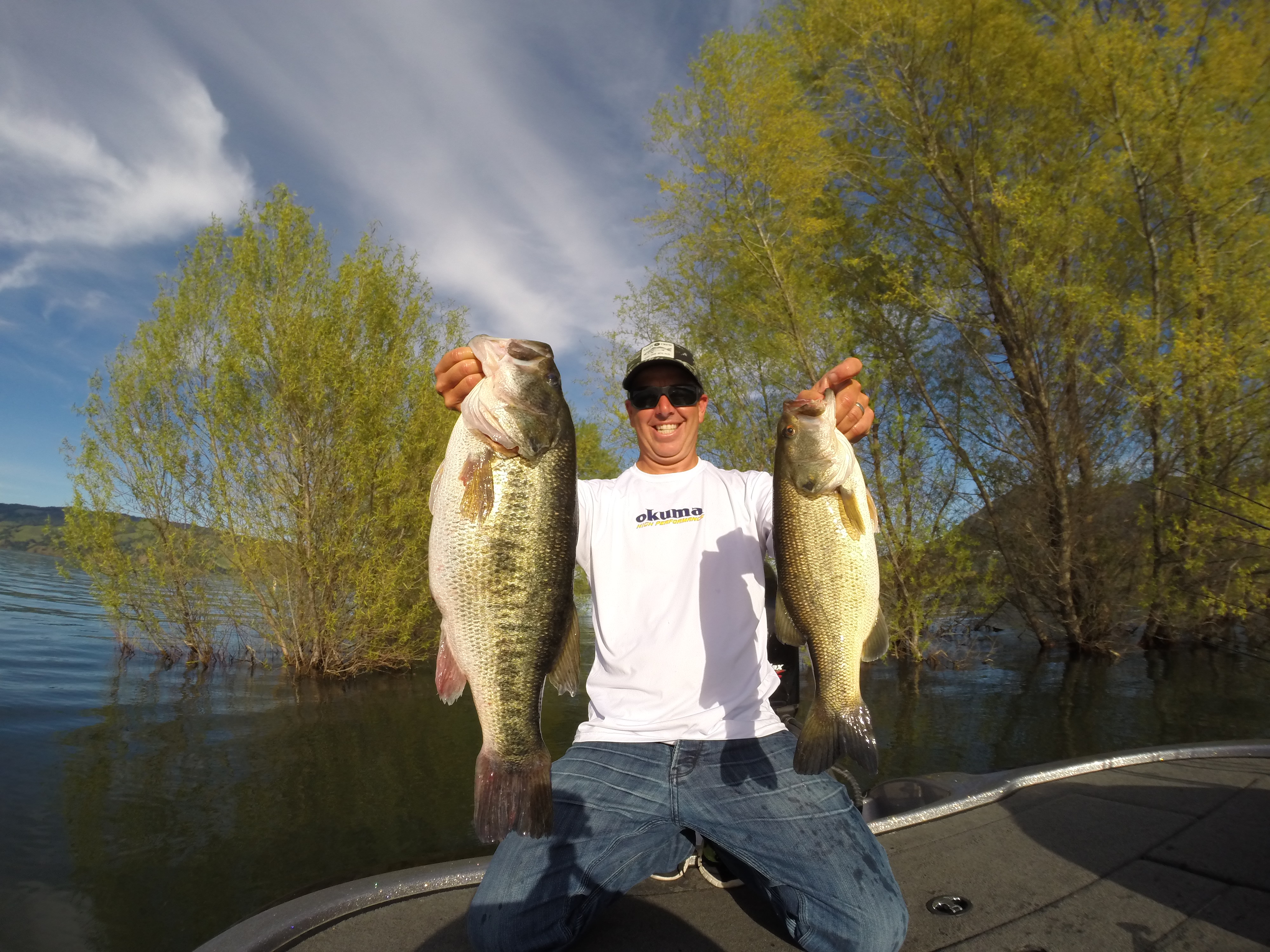
Todd Kline came west to become a champion surfer, and bass fishing never seemed to be in the cards. At least until he decided to play cards.
“I’d see bass boats going up to reservoirs when I was actually going to the casino on the Indian reservation, probably Barona (near San Diego),” saysKline, who has been both a surfer and an angler at the professional level. Perhaps next he’ll play in the main event at the World Series of Poker, but he’s made a living doing what drove him in his younger days in Florida before eventually relocating to Southern California.
“I had (bass anglers) tell me, ‘I’m going here or there,’ and I’m almost laughing about it and saying, ‘OK, cool; have fun,” the now successful FLW co-angler based out of San Clemente – located along the Orange County coast – says with a laugh. “But then when I did some research I realized that the bass fishing was actually great out here.”
After seeing the world as a surfing pro – he still racks up the frequent-flier miles as a commentator for the World Surf League – Kline is a four-time bass tournament winner on the FLW’s Costa Series Western tour, where he’s earned about $125,000 in prize money fishing tournaments with the established professionals, though co-anglers who win tournaments can make a large purse.
So, yeah – one week he might be interviewing some of the world’s elite surfers in Perth, Australia, and fishing a big tournament at Clear Lake the next – it’s good to be Todd Kline.
Getting to know bass angler – and current CS contributor – Todd Kline. (June)
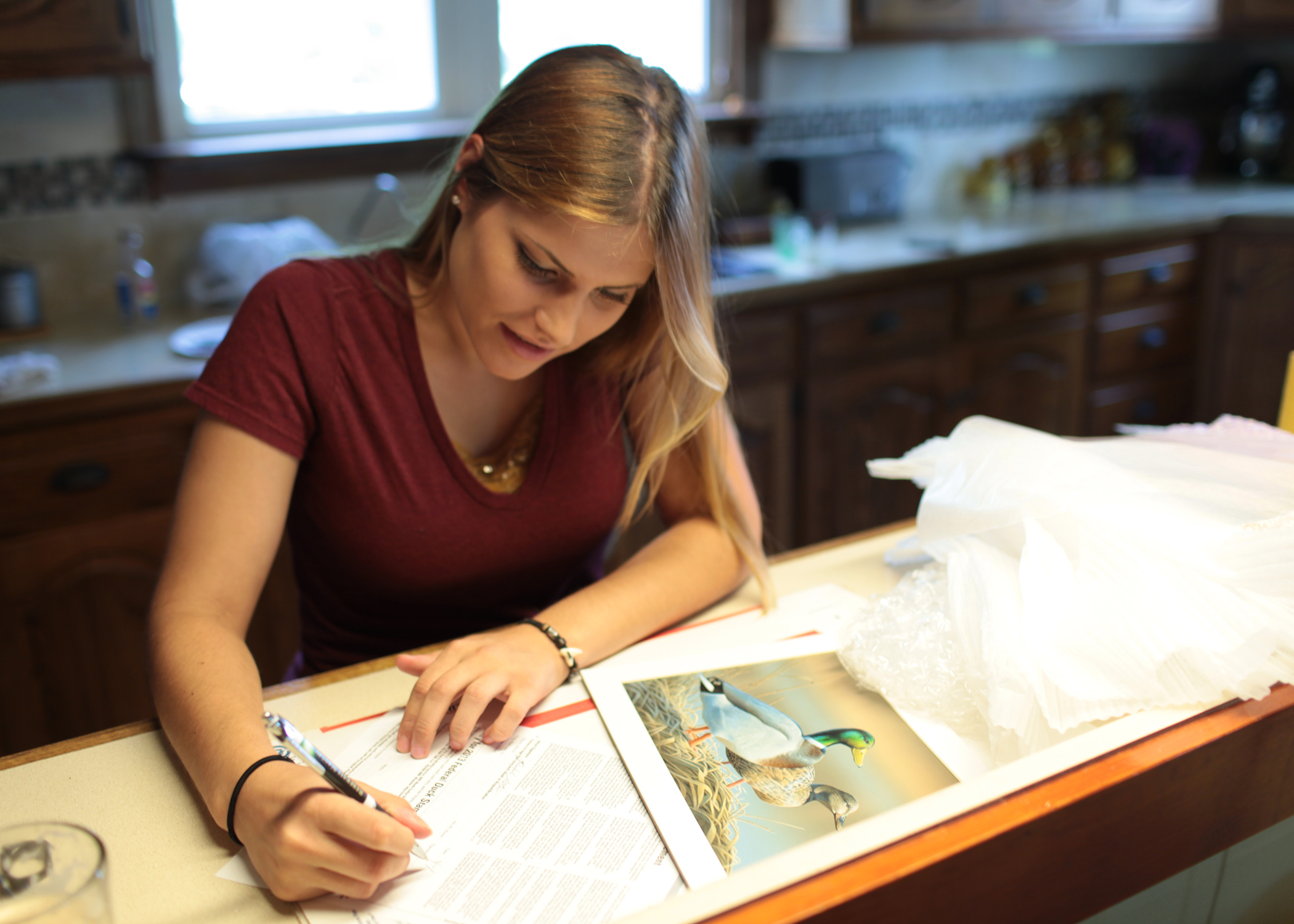
SO WE KNOW FOR every Rob McBroom, who understands he’s not in it to win it, and for every Tim Taylor, who deep down believes this is going to be his year, there’s a sense of purpose in the journey from blank canvas to individual artistic expression.
“Abstract painting is the realm of the intellectuals,” Taylor says. “Realistic painting, realistic duck stamps, are by people who have invested most of their lives in observing the wildlife, of learning how to become a painter. There’s no shortcut to being good.”
Winning a contest like this also is void of those shortcuts. The movie’s grand finale features the actual two-day judging, which in this instance was at Ohio’s Maumee Bay State Park on Lake Erie. Golden Davis manages to portray the process as taut, tense and nerve-wracking.
A roomful of artists – some who are true conservationists and wildlife lovers, others with $ signs dancing in their heads – await five judges’ decisions on which paintings progress and the others that get eliminated one by one.
“I was a little worried about being able to capture the tension in the room. I had other people describing it to me as watching paint dry, and I was a little nervous,” Golden Davis admits. “I wasn’t sure if we did, but when I first showed the film, people were yelling at the screen when people would get knocked out or move along to another round. You tend to have a fairly passive audience that’s watching documentaries. But when I saw that (yelling), it was a big sigh of relief.”
The survivors move onto the next round with a points system and a minimum total needed to make the final round. For contest lifers like Taylor and the determined Grimm, flanked by his wife and three kids, this is waiting for the envelope reading of the Oscars’ Best Picture, the Heisman Trophy or, as Grimm thinks, the winner of American Idol (cue judge Simon Cowell, the scourge of Idol hopefuls, asking Rob McBroom, “What the bloody hell was that?” when voting on his painting).
In a movie with a fast-paced 71 running minutes, the climax is the winning depiction of the judges’ choice for the perfect Federal Duck Stamp.
“I remember when I was young and just getting into buying the Federal duck stamps and looking at that artwork on there and thinking just how amazing it was that some artist out there painted that,” Grimm says. “Following in that path and being part of that history, that was a goal of my life.”
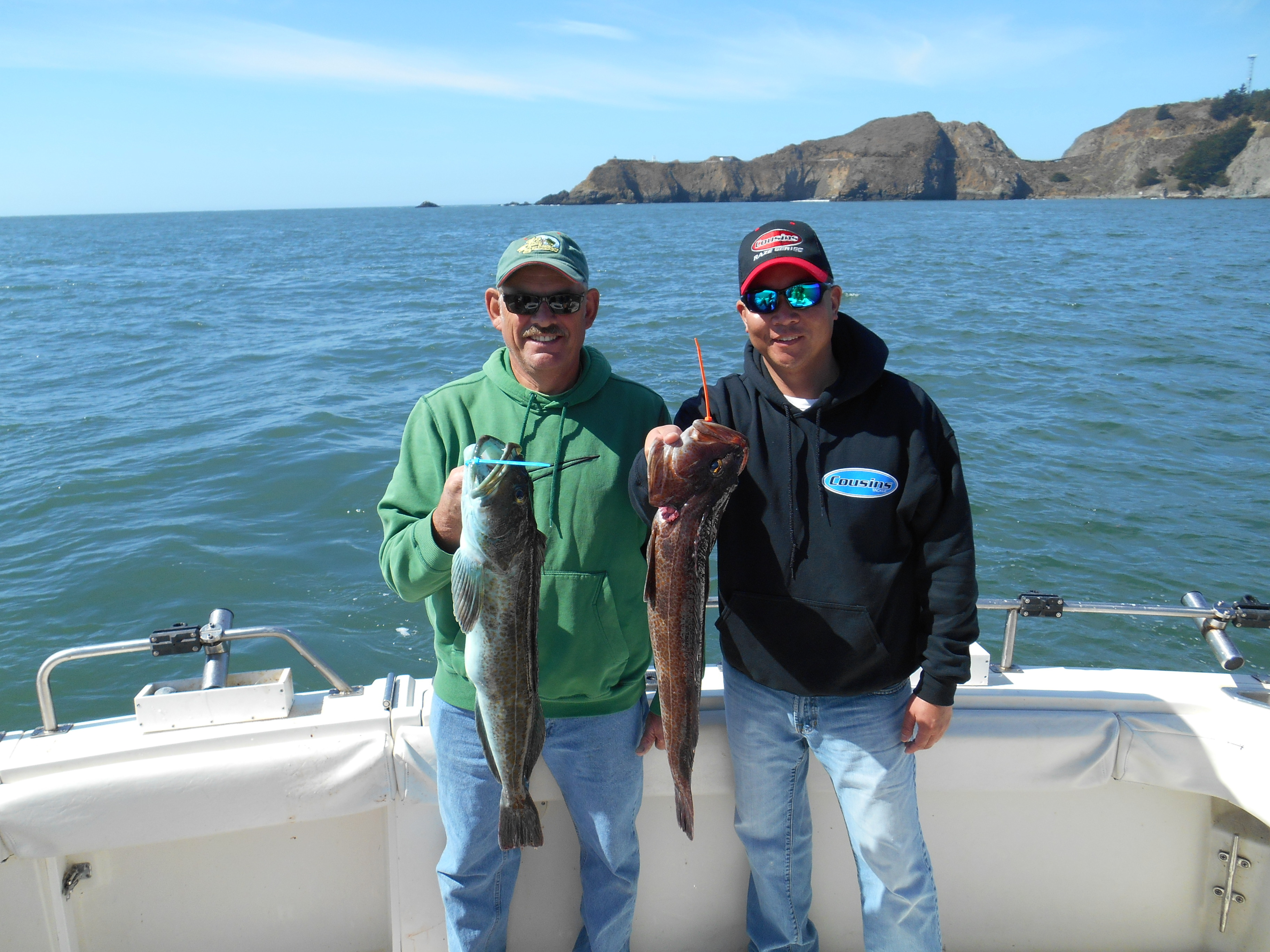
As we made the run up the Marin County coast, I had the opportunity to talk with Smith as he piloted Flash 2
towards our destination. He is a third-generation party boat skipper who started fishing with his father, Capt. Chris Smith, aboard the Captain Hook. When he was just 13, he became a deckhand on his grandfather’s boat, the Happy Hooker.
I watched intently as a series of GPS waypoints came into view on the electronics. Smith informed me that we would be fishing near Duxbury Buoy. Within a short time he slowed the boat and set up our first drift of the morning.
It did not take long before the rockfish started coming aboard. While the action heated up all around me, other than a few small black rockfish, I was stuck in a bit of a lull. It was a lot of waiting, waiting and watching as the others enjoyed constant action.
After what seemed like an eternity, my rod loaded up and I knew this was not another little rockfish. Even though it had been a few years, from the power and weight of the fish I could tell that it was a lingcod. Lings make fine table fare and are coveted as such. After a spirited fight, Maxwell skillfully netted the toothy fish.
On our side of the boat, Rigler managed to land a nice keeper lingcod, as well as score a nice bag of rockfish. I was lucky to land another ling and a mess of rockfish.
On the back of the boat, Doug Wohleking and his party were enjoying the fast-paced action as well. When the fish are biting, as they were on this day, time quickly disappears; before we knew it, it was time to return to the dock.
With a bunch of good-eating rockfish in the cooler, it was time to enjoy the scenic trip back down the coast and under the Golden Gate Bridge. These are spectacular views that you can only experience from the deck of a boat.
-Mark Fong, on a memorable day of deep-sea fishing in the Pacific. (November)
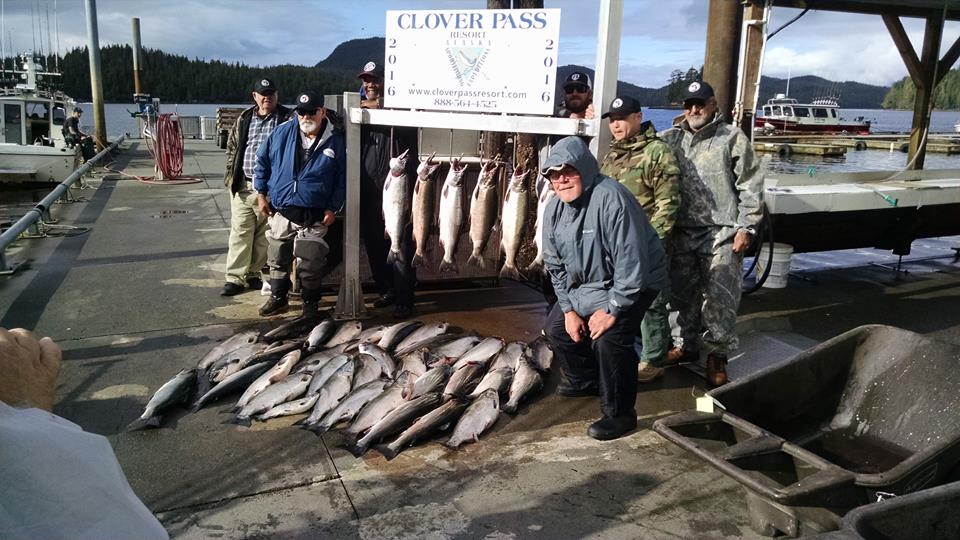
KETCHIKAN PROVED TO BE everything these American heroes hoped to experience. The group was very competitive on the water – the vets split into teams and fished out of separate boats. This year’s trip surpassed the numbers that were landed from the previous year’s trip to Southeast Alaska. In all, almost 600 pounds of halibut and salmon fillets were packed up. (As per a tradition from the year before, Houston will freeze a lot of the wild salmon and halibut and have it served at a Purple Heart Anglers fundraising banquet next April.)
And the catch rate was high when factoring that the first day of fishing was wiped out by a storm that blew into Ketchikan. But even that day and throughout the trip, the warriors got to take in some sightseeing and wildlife viewing, both on land in the form of bald eagles and big game, and on the boat, spotting hundreds of whales.
“They didn’t get any giant fish; they just had a lot of fun. These guys were able to experience the country that they’ve served, in a way that they had never been able to,” Houston says. “Some of the guys were talking about how they could scratch something off their bucket lists.”
Houston prefers to be in the background and behind the scenes during excursions in California, where he’s been the master of ceremonies for everything from rockfish charters off the Bay Area coast to upland bird hunts in the Central Valley, but the veterans implored him to get in on the action when a silver bit the trolling set-up.
“All the guys on the boat said, ‘You’re up, dude.’ I was the guy who was holding onto the guys who were catching (fish). I’m helping them hold their rod in the chest and helping them stabilize themselves against the railing,” Houston says. “The guys were inside the cab on the six-pack boat to get out of the drizzle, and I’m standing at the door waiting for the next guy to come out. The fish hit the rod and I grabbed a hold of it and set the hook, turned around and said, ‘Come on.’ They all said, ‘No! Your turn.’”
But the traveling party, which also included a California fishing guide who helped on the boat, was far more excited when one of the veterans reeled in a silver or halibut. When one salmon was brought to the boat, Houston jokingly asked the man if it was his first from Alaskan waters.
“First salmon ever,” was his reply.
-Purple Heart Anglers taking a group of disabled veterans on a fishing trip of a lifetime to Alaska. (November)
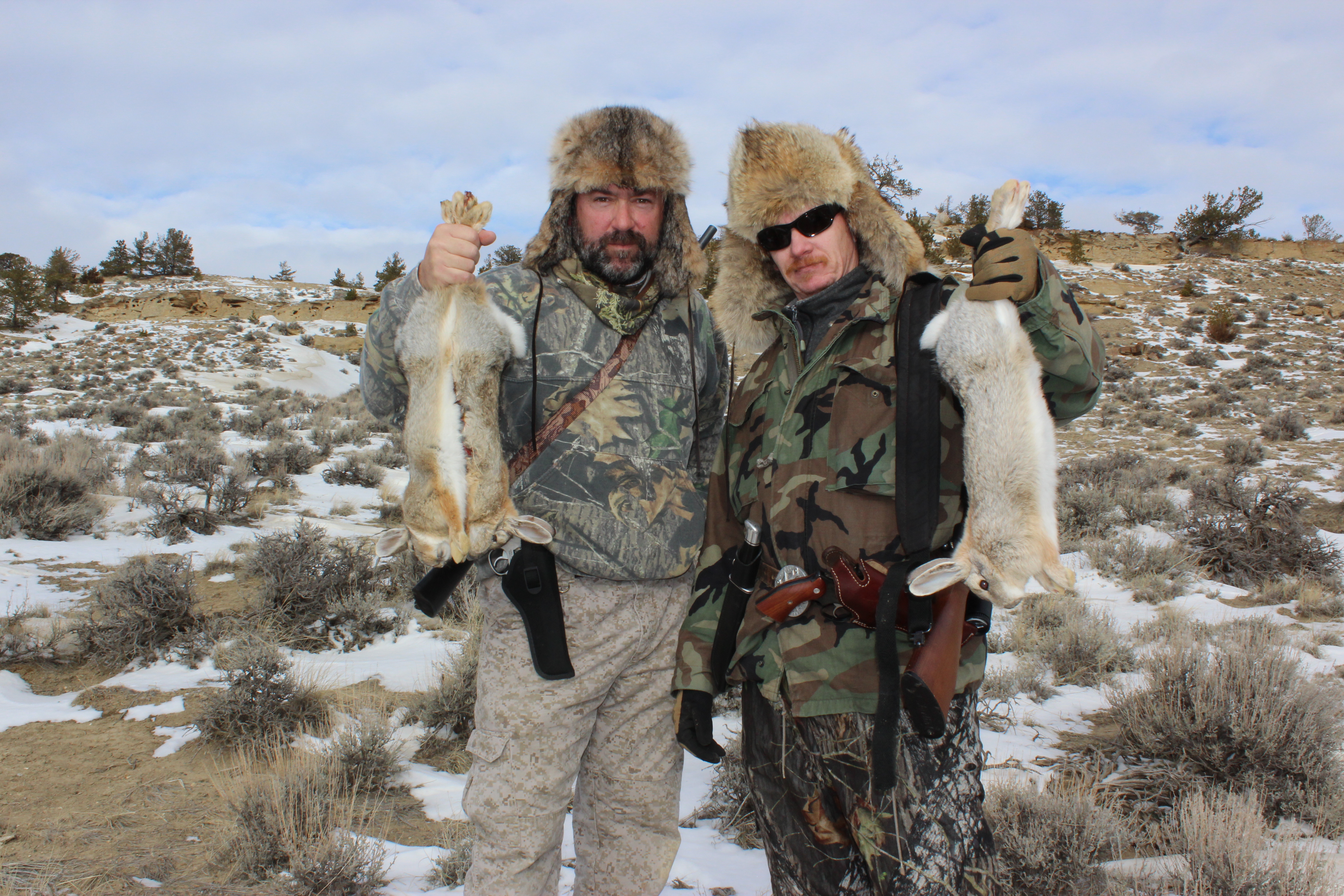
We drove as far as we could and then got out. We knew with the recent snowfall, we wouldn’t be able to get much further on four wheels.
We hiked in the snow along the Oregon Basin ridge near the Wyoming town of Cody for over a mile. The sky was grey but our mood high; we were there to hunt rabbits, just like we’d done the previous 20 years we’ve hunted together.
We split up by ourselves, but still we were together on the mountain. For over an hour, I hiked the ravines with my friend, Darrin, looking for game. One or two times I spotted him nearby, and he was doing exactly what I was doing. I stood there and watched him as he hiked the hills, feeling lucky to have a good friend who loved what I loved equally.
We met back near the vehicle, each of us with a couple of rabbits. We sat on the tailgate and watched the setting sun fight through the rain clouds. I don’t drink, but I had a cold beer with Darrin, parked there in the middle of a sage-covered field.
That was my first Wyoming rabbit hunt, and despite the cold temperatures, sharing the hills with a good friend made the time in the field well worth it. …
Darrin passed away unexpectedly in September of this year in Cody, Wyo., and I will truly miss him. He was an amazing friend and one of the smartest individuals I have ever met. He spent much of his professional life as a fisheries biologist and the two of us collaborated on several published projects together. I have many fond memories of Darrin and I in deep discussions on a variety of topics at the edge of some canyon miles from anywhere. I know that of all our adventures together, these conversations at the edge of the world are what I will miss the most.
I realize that nothing lasts forever, but it truly hurts knowing that I will never again glass a canyon, share a rabbit hunt or simply head out to the wild with a rifle slung over my shoulder, with Darrin at my side. He was truly a good friend. If I had known that last year’s hunt with my daughters was going to be the last time we saw him, I think we all would have savored that moment much longer.
Darrin passed away unexpectedly in September of this year in Cody, Wyo., and I will truly miss him. He was an amazing friend and one of the smartest individuals I have ever met. He spent much of his professional life as a fisheries biologist and the two of us collaborated on several published projects together. I have many fond memories of Darrin and I in deep discussions on a variety of topics at the edge of some canyon miles from anywhere. I know that of all our adventures together, these conversations at the edge of the world are what I will miss the most.
I realize that nothing lasts forever, but it truly hurts knowing that I will never again glass a canyon, share a rabbit hunt or simply head out to the wild with a rifle slung over my shoulder, with Darrin at my side. He was truly a good friend. If I had known that last year’s hunt with my daughters was going to be the last time we saw him, I think we all would have savored that moment much longer.
-Tim Hovey on hunting rabbits with a friend gone too soon. (December)
Have a great 2017, everyone!

